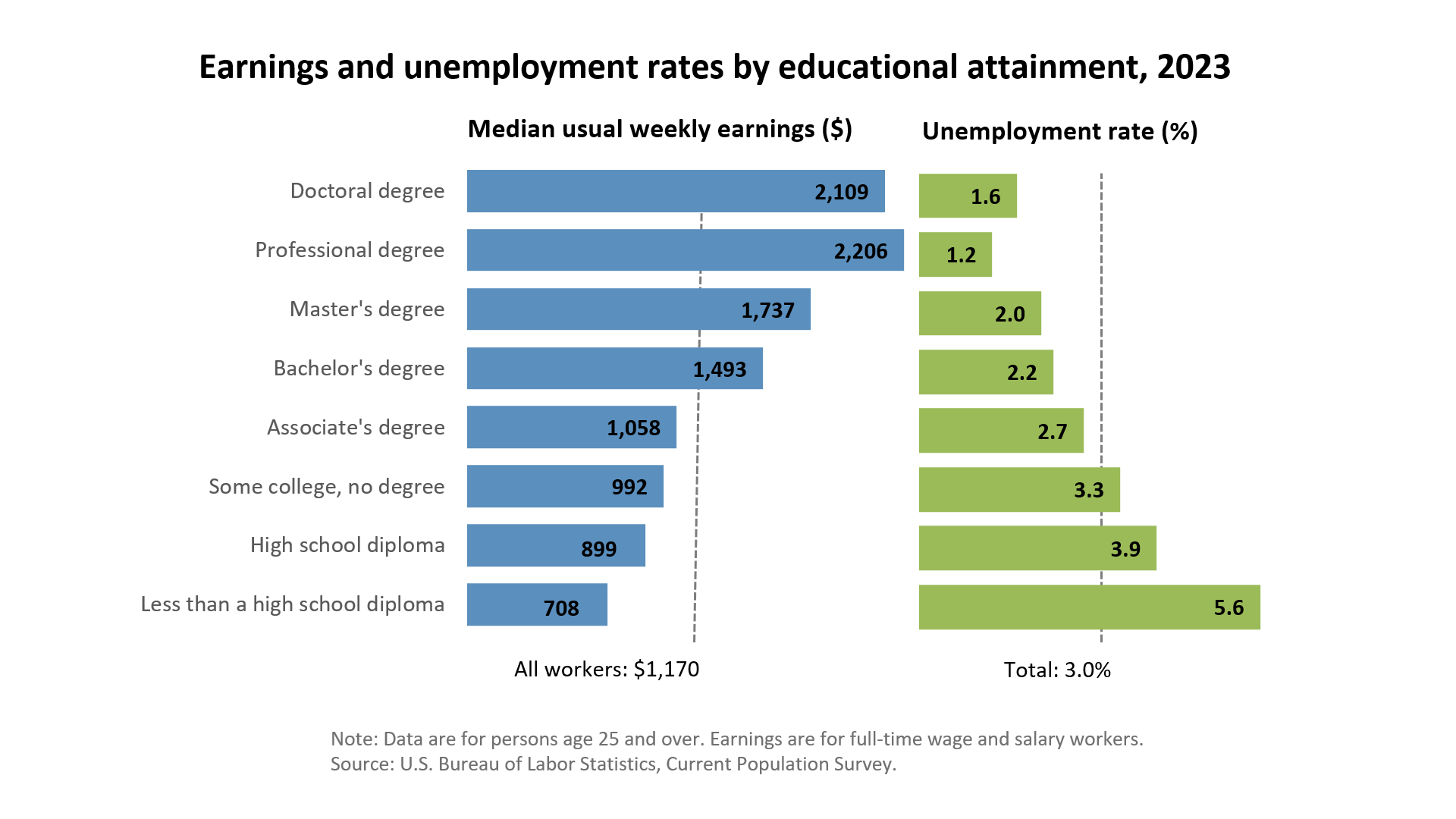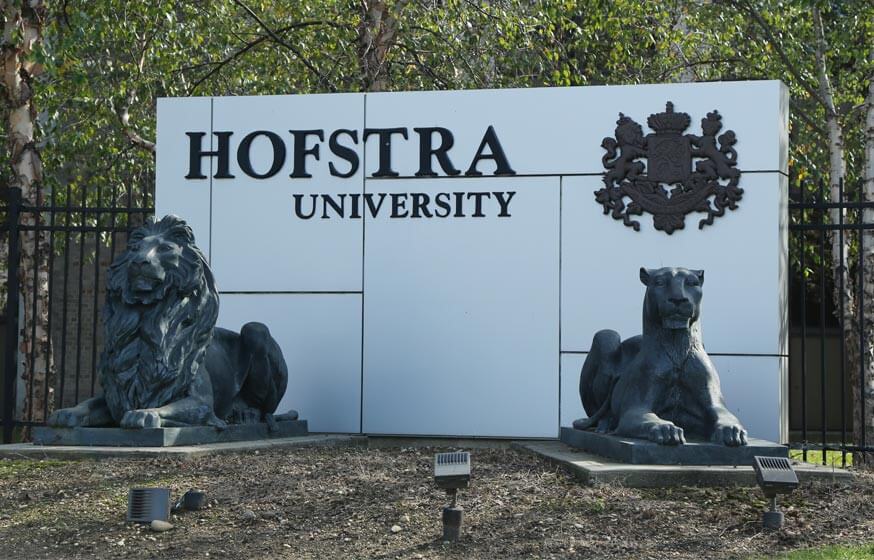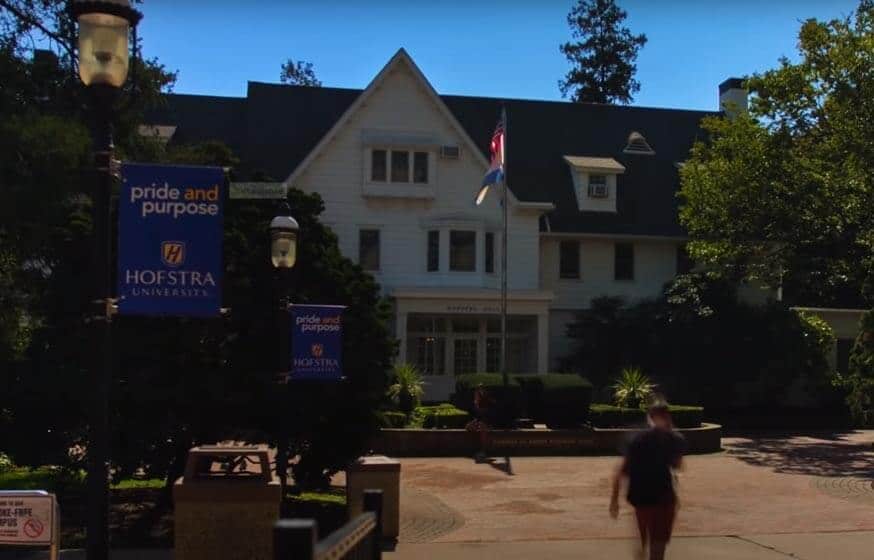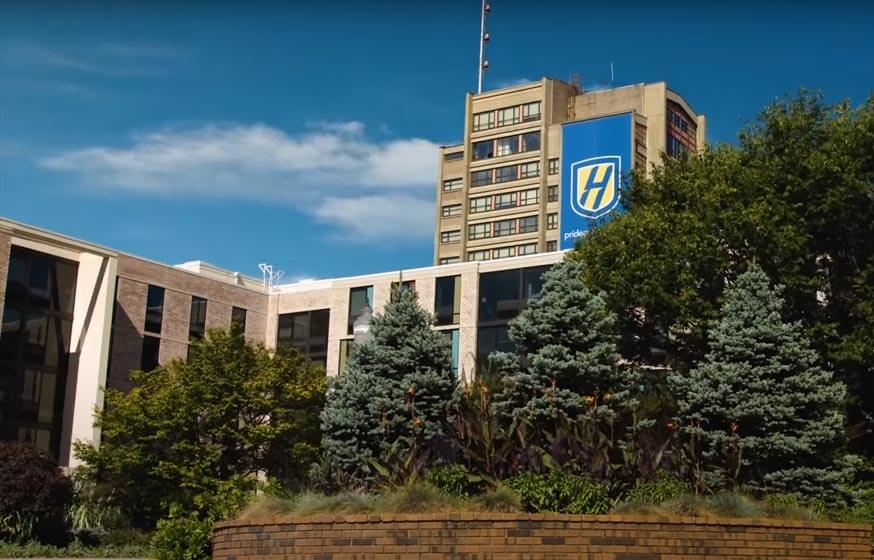Get Matched With Online Colleges
If you visit the campus, it might be bigger than you expect. While buildings are close to each other, you’ll still need to walk and may even decide to drive to get to your classes from your dorm room.
The town of Hempstead, where the school is located, isn’t technically very large, it’s actually on Long Island, not far from New York City. Depending on your mode of transport you’ll be 45 minutes to 1 hour away from the city while you’re living at the school. In fact, you realize that parts of the university blend in with the community, such as the campus public safety building. So, if you decide you want to go to a store or restaurant that isn’t in Hempstead, you’ll always have the option to spend time in the local community, or take a day trip into the city.
Search All Programs
Overview of Hofstra University
Hofstra educates students looking for undergraduate through doctoral degrees. The student population is nearly 11,000 and the student-to-faculty ratio is a solid 13 to 1. You should be able to easily communicate with your professors any time you have trouble with a course.
General Information
| School Type | Private not-for-profit |
|---|---|
| Campus Setting | Suburb: Large |
| Campus Housing | Yes |
| Student Faculty Ratio | 13:1 |
| Graduation Rate | 65% |
| Year Founded | 1935 |

Student Enrollment
Total Students10,804
6,498
4,306
Undergraduate Student
Male 2,924
Female 3574
Graduate Student
Male 1,938
Female 2,368
Explore Map
Admissions
APPLICATIONS24,425
ACCEPTANCE16,609
Acceptance Rate68%
Enrollment 1,495
| Admissions | |
|---|---|
| Application Fee | $70 |
| High School GPA | Required |
| High School Rank | Recommended |
| High School Transcripts | Required |
| College Prep Courses | Required |
| Recommendations | Required |
| Formal demonstration of competencies | Recommended |
| SAT/ACT | Considered But Not Required |
| TOEFL (Test of English as a Foreign Language) | Required |
| Application Deadline | Rolling |
| Common Application Accepted | Yes |
Tuition Cost & Financial Aid
Your college education is likely to be pricey. Your parents are likely to be discussing the total price with the university - all together your tuition, room and board, books, supplies, and other expenses may top $65,000. Luckily, you probably won’t have to pay all of that yourself.
In a recent academic year, the average net price was $32,975. This is the cost students were still expected to pay after their financial aid had been applied. Because financial aid, especially federal aid, is provided to families based on their annual income, you may still not have to pay that full amount. You can see the breakdown of average net price by income below.
- Families earning less than $30,000 paid around $27,616
- Families earning between $30,001 and $48,000 paid around $30,662
- Families earning between $48,001 and $75,000 paid around $32,962
- Families earning between $75,001 and $110,000 paid around $34,800
- Families earning more than $110,001 paid around $35,037
Financial aid was awarded to 97% of a recent freshman class. They received an average of $27,334 in grants or scholarships. The same percentage of students received an average of $25,492 in institutional grants and scholarships.
| Average net price | 2018-2019 |
|---|---|
| Net Price | $32,975 |
| Average Total Aid | $27, 334 |
| Students Receiving Financial Aid | 97% |
| Room & Board | $15,700 |
Sticker Price
- Tuition In-State - $47,510
- Tuition Out-of-State - $47,510
- Books and Supplies - $1,000
- Room & Board - $15,700
- Other - $2,050
Academics
The most popular degree programs offered here are business, management, marketing and related support services; communication, journalism and related programs; health professions and related programs; social sciences; and engineering.
You may already know what you want to major in. Once you’re committed and decide to stay at Hofstra past your first year, you’ll be part of the retention rate. This rate measures how many students think it’s worth their time to remain at the school past their first year. At Hofstra, this includes 83% of freshmen students. This is an excellent number, indicating that students are pleased with their experience at the school.
Looking down the road, the 4-year graduation rate is 55%, which is a bit below the national average and the 6-year graduation rate is 65%, which is about even with that average. While this may seem strange, it’s become the national trend over the last few years for students to take more than the traditionally expected four years to graduate. It allows them to spend time working and engaging in internships, and no employer will think less of you for taking longer to complete your degree.
Now, let’s say one of your classes conflicts with a lab for a different class. You didn’t notice this before you signed up, so what can you do? You won’t be able to take an evening class, but you may be able to take the class online. You’ll need to speak to your academic advisor about issues like this, but it’s good to know you have that option available.
Retention
Rate
4 year
Graduation
Rate
6 year
Graduation
Rate
Student Population Total
Student Population 10,804
6,498
4,306
Most Popular Programs & Majors
(# of Diplomas Awarded by Subject)
| All Business Majors | 399 Total Graduates / 26% |
|---|---|
| Finance, General | 100 Graduates |
| Accounting | 91 Graduates |
| Marketing/Marketing Management, General | 73 Graduates |
| Business Administration and Management, General | 60 Graduates |
| Communication, Journalism, and Related Programs | 253 Total Graduates / 16% |
| Radio, Television, and Digital Communication, Other | 66 Graduates |
| Public Relations/Image Management | 65 Graduates |
| Journalism | 56 Graduates |
| Radio and Television | 38 Graduates |
| Health Professions and Related Program | 175 Total Graduates / 11% |
| Community Health and Preventive Medicine | 48 Graduates |
| Allied Health Diagnostic, Intervention, and Treatment Professions, Other | 30 Graduates |
| Audiology/Audiologist and Speech-Language Pathology/Pathologist | 29 Graduates |
| Health Services/Allied Health/Health Sciences, General | 25 Graduates |
| All Social Science Majors | 121 Total Graduates / 8% |
| Political Science and Government, General | 39 Graduates |
| Criminology | 28 Graduates |
| Sociology | 20 Graduates |
| Economics, General | 15 Graduates |
| All Engineering Majors | 106 Total Graduates / 7% |
| Engineering Science | 48 Graduates |
| Mechanical Engineering | 37 Graduates |
| Electrical and Electronics Engineering | 11 Graduates |
| Industrial Engineering | 6 Graduates |
| All Other Diplomas | 32% |
Outcome & Salary
Once you’re ready to graduate from college, it will be time to celebrate. Not only are you done with school, but maybe you just finished an internship and landed the job you were aiming for. Not only that, but you can expect good things salary-wise based on previous graduate’s statistics. Those graduates early-career salaries averaged around $57,300. And their mid-career salaries increased to an average of $110,400. Now, that’s something to celebrate.
The average 4-year cost of education, which is $131,900 at this school, will affect your eventual return on investment (ROI). Graduate’s average 10-year earnings potential is $731,210 and their 20-year earnings potential is $1,835,210. Once the cost of education is deducted, a graduate’s 10-year projected ROI is $599,310 and their 20-year projected ROI $1,703,310.
A high school graduate who goes straight to work earns a national average salary of $38,792. Their 10-year projected income is $387,920 and their 20-year projected income is $775,840.
| Graduates Salary | |
|---|---|
| College Grads Early Career Salary | $57,300 |
| College Grads Average Salary | $73,121 |
| College Grads Mid Career Salary | $110,400 |
| Return on Investment (ROI) | |
|---|---|
| 10 Year Salary Earnings Potential | $731,210 |
| 20 Year Salary Earnings Potential | $1,835,210 |
| Cost of Education (Net Price) 4 Year | $131,900 |
| 10 Year Projected ROI | $599,310 |
| 20 Year Projected ROI | $1,703,310 |
| No College Education Salary Comparison | |
|---|---|
| National Average Salary | $38,792 |
| 10 Year Projected Income | $387,920 |
| 20 Year Projected Income | $775,840 |

Related Top College Resources












